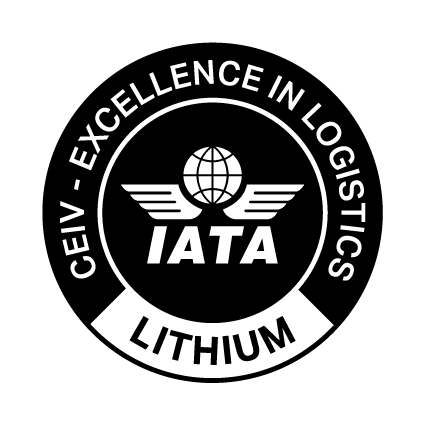Be a strong link in the lithium battery supply chain

Representing one third of the dangerous goods transported by air, lithium batteries have become the preferred energy source to power a wide variety of consumer goods, ranging from mobile phones to children's toys to cars and e-bikes. Though widely used, most people are not aware that lithium batteries are dangerous goods that can pose a safety risk if not prepared in accordance with transport regulations. In some cases, there is even intentional mis-declaration of lithium battery shipments, causing safety incidents.
The Center of Excellence for Independent Validators Lithium Batteries (CEIV Li-batt) is a certification program designed to enable the supply chain of lithium battery products - shippers, freight forwarders, cargo handling facilities and airlines - to meet their safety obligations by complying with the applicable transport regulations, and to demonstrate their capability and competency in handling and transporting lithium battery products.
Raise the bar with CEIV Li-batt
- Gain competitive advantage and recognition for operational excellence - CEIV Li-batt provides your partners with assurance of your capacity and resources in handling and transporting lithium battery shipments in a safe, efficient and compliant manner.
- Do your part to strengthen the lithium battery supply chain - The CEIV Li-batt certification identifies those companies following industry standards and best practices, increasing the overall level of awareness of lithium batteries as dangerous goods, and allows increased collaboration and confidence among stakeholders.
- Increase efficiency and reduce costs - The certification process includes training of your employees to handle and transport lithium battery shipments in a safe and compliant manner. It increases lithium battery awareness, establishes standardized and efficient processes and operatons, and ultimately improves workforce competence, performance and collaboration.
LATAM Cargo raises the bar for cargo transport with CEIV Li-batt
Help improve the level of competency and quality
The CEIV Li-batt certification assesses your organization based on the guidelines for the Dangerous Goods Regulations (DGR) and Lithium Battery Shipping Regulations (LBSR), and covers the following critical areas of lithium battery handling and carriage operations:
- Quality and safety management - Including organization and management, your Quality Management System and Safety Management System, management reviews, key performance indicators, and corrective and preventive actions.
- Personnel - Including staff functions and tasks, training programs and management of training records.
- Documentation - Including processes and procedures, infrastructure and equipment as well as document control procedures and record keeping.
- Infrastructure and equipment - Including your premises, IT systems, calibration, and maintenance.
- Complaints and reporting - Including incident and non-conformance reporting and response policies.
- Supplier and customer management - Including how you ensure partners comply with regulations.
- Self-inspections and internal audits - Including how you carry out ongoing and periodic monitoring and auditing.
- Cargo operations - Including ground transportation, acceptance of shipments, temporary storage, and warehousing.
Be supported every step of your CEIV Li-batt journey
The IATA Certification process is designed to guide and support you to success. We give you the understanding, tools and expert advice you need to achieve your organization's certification. The process is as follows:
- Training - At least two (2) key staff must pass the Lithium Battery Logistics Safety Management course.
- Self-assessment - Once your key staff are trained, guided by our team, they carry out a self-assessment using a provided checklist, ensuring all materials, evidence and documentation are available to the IATA assessor.
- Documentation review - The IATA assessor reviews all documents submitted to prepare the on-site phase of the assessment process.
- Assessment - During a period of three (3) to four (4) days, the assessor will visit the facilities to observe that the current operations, processes and procedures of the organization are conducted along the same lines as described in the various documents provided by the organization, and that they conform to the CEIV Lithium Batteries audit checklist requirements. The assessor uses a standardized assessment checklist and criteria to ensure uniformity and objectivity. The assessor will then provide comprehensive feedback, including a gap analysis report and a detailed list of the specific findings and areas of improvement, to enable your organization to make the necessary adjustments.
- Validation - The assessor works in close cooperation with your organization to ensure that all feedback is actioned. Your organization will need to provide a corrective action plan (CAP) specifying the actions you have taken and that are planned, together with an implementation date. The CAP is validated by the assessor as meeting CEIV Li-batt certification criteria. As your organization executes its plan, you must submit clear evidence of its full implementation to the IATA assessor for validation. Once the CAP has been satisfactorily implemented, the assessor will issue the IATA Assessment Report, and your organization will be granted the IATA Certification.
- Re-certification - The CEIV Li-batt certification is valid for two (2) years. To remain certified, your key personnel will need to complete refresher training, and a new assessment will be carried out to check compliance with the certification requirements and continuous improvement.
Talk to a certification expert today to find out how we can help you ensure you're up to standard.
Note: IATA Certification does not handle the IATA accreditation program. If you are a travel agent or cargo agent, please visit the customer portal to get support regarding accreditation services and training.